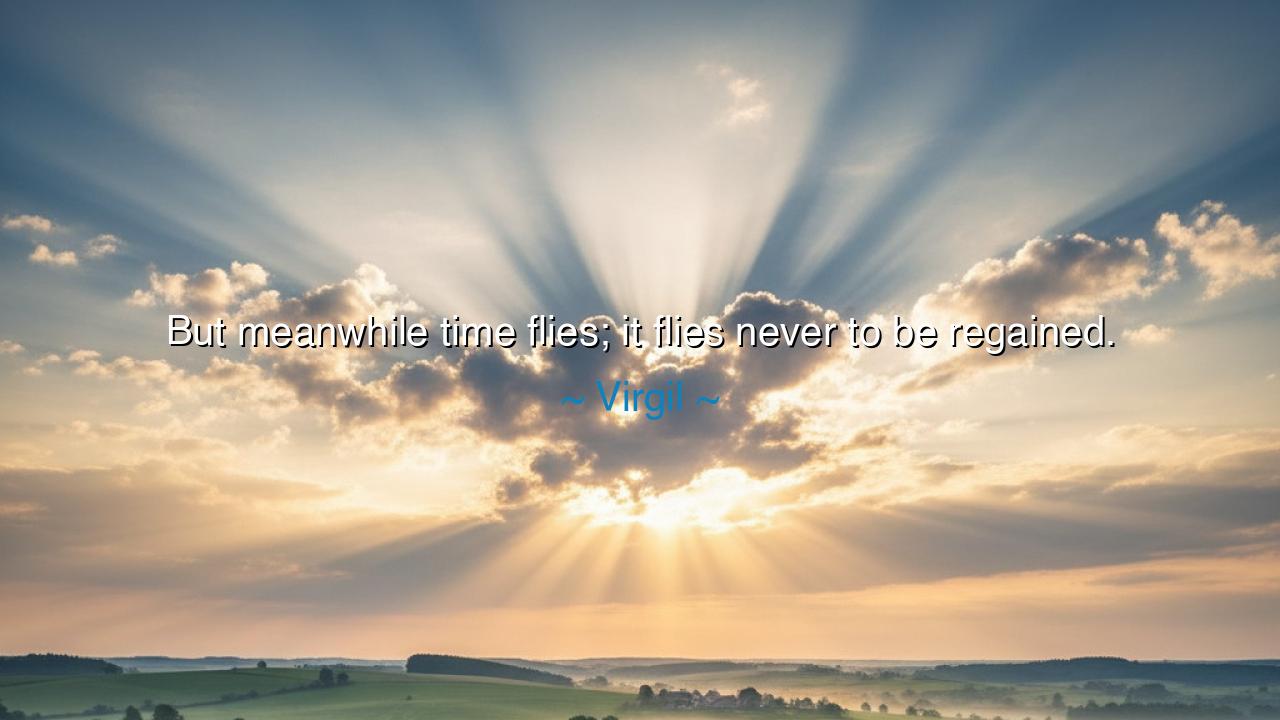
But meanwhile time flies; it flies never to be regained.






The poet of Rome, Virgil, whose verses shaped the soul of an empire, wrote with eternal weight: “But meanwhile time flies; it flies never to be regained.” These words, drawn from his Georgics, speak not only of the labor of farmers or the passing of seasons, but of the universal truth that life itself is swift, fleeting, and irreversible. Time is the most precious of all treasures, and yet it is the one most easily lost, for it cannot be stored, nor traded, nor called back once it has taken wing.
The meaning of this saying is as sharp as the edge of a sword: life hastens forward, whether we notice or not. The hours slip by with the beating of the heart, the days dissolve like mist at sunrise, and the years are carried away like leaves in the river’s current. Virgil warns us that while we delay, while we hesitate, while we fill our days with distraction, time flies. And once it has flown, no power—not gold, not wisdom, not tears—can summon it back.
Virgil himself lived in an age of turmoil, watching Rome transform under the rise of Augustus. He saw that empires, like men, are bound by the law of time. The greatness of cities, the glory of kings, the vigor of youth—all are subject to the same law: they pass. Thus his poetry, though draped in myth and pastoral imagery, continually returns to this refrain: seize the moment, for the seasons of life will not wait. His words echo the ancient wisdom of the Greeks, who spoke of kairos—the opportune moment—as a gift that must be grasped before it vanishes.
History gives us luminous examples of this truth. Consider Alexander the Great, who by thirty had conquered much of the known world. He lived with relentless urgency, for he sensed, perhaps dimly, that his time was short. Indeed, he died at thirty-two, and the vast empire he carved dissolved within a generation. Alexander’s life is proof of Virgil’s warning: time flies with or without our awareness. Yet it also shows the power of acting with urgency, for though his life was brief, his legacy endures across millennia.
The lesson for us is double-edged. On the one hand, do not squander your days, imagining that you may recover them later. A wasted hour is a treasure thrown into the sea. On the other hand, do not despair that time is fleeting. Let its swiftness awaken you, sharpen you, move you to live with intention. For the brevity of life is not a curse, but a call—a reminder that every sunrise is a summons to meaning, and every sunset a warning that the day will not return.
Practical wisdom follows from Virgil’s cry. Begin each morning by asking: how shall I use this day so that it is not wasted? Give your time not to trivialities, but to pursuits that build, uplift, and endure. Love without delay; speak truth without fear; pursue your craft with diligence. Do not wait for tomorrow, for tomorrow is not promised. The wings of time are already beating above you.
So let Virgil’s words be etched upon your heart: “Time flies; it flies never to be regained.” Do not live as though your days are endless, but as though they are a fire that must burn brightly while it may. Let this truth rouse you to courage, to passion, to wisdom. For though time cannot be held, its passing can be honored—by living a life so full of meaning that, though the hours fly away, their echo resounds for generations to come.






AAdministratorAdministrator
Welcome, honored guests. Please leave a comment, we will respond soon